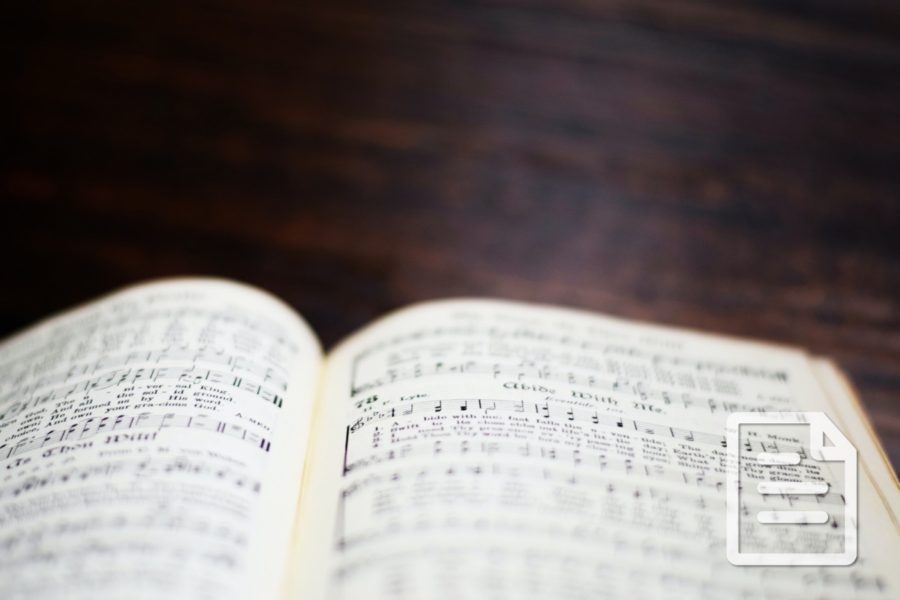In God’s grand design of worship, He gave us beautiful tools to show our love and adoration. Music, all visual arts, drama, dance, space, color, literature, imagination and creativity, and technical arts are all given as instruments for worship.
Throughout the Bible, praise can be seen and expressed through these many forms. In his book, Enter His Courts with Praise, Andrew Hill describes how art and singing was used in the Old Testament. “Praise and thanksgiving for the Hebrews involved noisemaking and raucous shouting (Ps. 27:6; 32:11; 33:3), singing and playing musical instruments (Ps. 66:2; 71:22; 100:2), hand-clapping and dancing (Exod. 15:20; Ps. 149:3; 150:4), and merrymaking in general (1 Chron. 16:1-6; Neh. 12:43). This praise issuing from the personal piety of the righteous contributed much to the jubilant, triumphant, and exuberant nature and spirit of Hebrew worship.”
While we should use anything we have to worship the Lord, I truly believe singing is the foundational element that all believers must share. Over 200 times in scripture we are commanded to lift up our voices and sing praise to our God. Therefore, we must see singing as not a suggestion or recommendation, but a command that God doesn’t just want from us, but He wants for us.
When we look at scripture concerning singing, we could look at many applications to the life of the believer and the Church as a whole. However, let’s look at 3 expressions of singing that are important to worship within the church and the home.
1. WE ARE COMMANDED TO SING.
As I mentioned already in this series, “How to Spell Worship”, my former Pastor who was tone-deaf once told our congregation, “I may not be a great singer while I’m worshipping, but I want to be a great worshipper while I sing.” I’ll never forget this statement because it takes us right to the purpose of personally singing and how it is an outpouring of a worshipful heart. I hear from people almost on a weekly basis, “John, I’m not much of a singer” or “I don’t really like to sing” or something of a similar tone. When I hear these types of comments, my hearts aches for them because I fear they are missing the point of singing entirely.
On a spiritual level, being good at singing should not be put on the same plane as other physical activities like sports, public speaking, or even playing a musical instrument. Singing is something that every believer should be a “pro” at not because of our physical ability, but because of the spiritual reason we sing.
About five years ago, I had to have unexpected vocal surgery and was required to be completely silent for a month, and was not allowed to sing for about 3 months. Although, I learned so much about worship during this extended quiet time, I’ll never take for granted the gift it is to lift my voice in praise. Psalm 100:1 says, “Make a joyful noise to the Lord…(KJV).” The word “noise” here means to make sound from a deep place, a shout, a splitting of the ears (yes, you read that right!), sounding or blowing an alarm, or a joyful triumphant sound. So, whether your voice sounds beautiful to the ear, or whether you sing like a loud alarm that is splitting the ears, I encourage you to be a singer to the Lord because we have a reason to sing.
2. WE ARE COMMANDED TO SING.
Singing was not just designed to be personal, but also to be shared with others. The modern prolific hymn writer and advocate of corporate singing, Keith Getty, says “We are designed to benefit from beauty and creativity. Have you ever wondered why we sing our national anthems and don’t just recite their lyrics, or why as children we learn our alphabet in rhyming songs rather than simply as a series of monotone spoken sounds? It’s because God made us to be powerful engaged in our sense and memories by music. Songs have the power to prompt a memory or transport us back to some other time and place. Our sense of imagination is another aspect of the dignity we have been given as human beings by God. It should not be belittled but embraced and nurtured, especially by the artistic endeavors of every local church.”
Singing intergenerationally in the local church is not only healthy, but when we sing and express corporately, we are uniting as the bride of Christ to encourage, instruct, exhort, and to pass on the gospel to all generations.
Psalm 145:4-7 declares, “One generation commends your works to another; they tell of your mighty acts. They speak of the glorious splendor of your majesty…They tell of the power of your awesome works…They celebrate your abundant goodness and joyfully sing of your righteousness” (NIV). As we look at this passage of scripture, it certainly seems like one big passionate worship service where multiple generations are together singing, leading, listening, and learning from each other. I love what Darren Whitehead says in his book, Holy Roar, about using corporate praise as a means to pass something on to those who come behind us: “The holy roar of praise is not self-contained, not just for a particular people in a particular space. It’s not praise for the purpose of pumping up the present crowd. It’s for the purpose of passing on the faith from one generation to the next.”
Singing must be a staple in the home as well as the church. Singing at home is the great connector between many points of the Christian life. When we train our children to sing at home, they feel more confident to sing personally, equipped to sing at church, prepared to carry on the tradition with their own children in the future, as well as connecting us to our forever home in heaven when we will sing with every tribe and nation around the throne of God.
3. WE ARE COMMANDED TO SING WITH VARIETY OF SONGS.
Singing must be part of the culture in a family. Songs can break forth early in the morning, at the table, playing in the yard, riding in the car, before bed, or a myriad of other places. We must not only be cautious of what songs our kids are singing, but also strategic in teaching them songs of deep truth about the trinity, the gospel, the Word of God, and other spiritual subjects. We can do this through using a variety of song genres as we worship. Paul tells us in Colossians 3:16 and Ephesians 5:19 that we should teach, admonish, and utter truths in psalms, hymns and spiritual songs. Books have been written on the differentiation of these three categories, but let me briefly attempt to explain them so to stress the importance of each category.
PSALM:
The meaning of the word “psalms,” or psalmos in the Greek, is classified as a sacred ode, accompanied with instrumentation, or the book of Psalms. The key word here is “sacred” as it differentiates it from other songs. A sacred tune is a song, psalm, or canticle that can be found in the pages of scripture from Genesis to Revelation. Key examples would be the Song of Moses (Exodus 15:1-19), The Magnificat (Luke 1:46-55), The Benedictus (Luke 1:68-79), The Song of the Redeemed (Revelation 7:9-17), and many others. Another aspect of a psalm is when songwriters today take scripture and partner it with a new modern melody. This is still considered a psalm and should be sung within the home and the church.
HYMN:
A hymn comes from the Greek word hymnos which means a song of praise about gods, heroes, conquerors; a hymn. Therefore, a hymn is a song of praise that is more objective in nature with themes that have to do with the triumphant nature of God and the redeeming story of God. Songs that declare who God is have been sung for thousands of years and will continue throughout eternity. Hymns that tell the story of God, past, present, and future, are powerful tools that teach the young, and remind and encourage the mature. So remember, hymns are not defined by style or date of composition, but rather the theme and truth.
SPIRITUAL SONG:
The last genre of song that Paul encourages is spiritual songs. These are two Greek words, pneumatikos and odé, that are put together to mean a song or chant relating to the human spirit or soul. In other words, this style of song is more subjective in nature and comes from the personal hearts of the church. They are supplications, declarations, and celebrations coming from the personal spirits of the sons and daughters of God. A spiritual song can be a message and melody from past generations, newly written songs, or even a spontaneous song of praise in a moment of worship.
Of course, not every worship song can fit perfectly into one of these three categories. Sometimes songs include sections of two or all three genres. But whatever the category a song falls into, the point is to sing to the Lord. Whether we sing individually or intergenerationally, we are given a gift of great freedom to use a variety of songs within the boundaries of truth.








